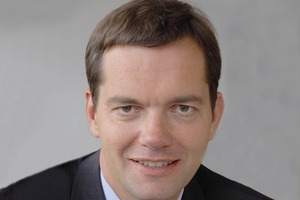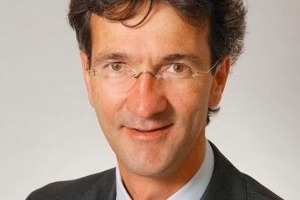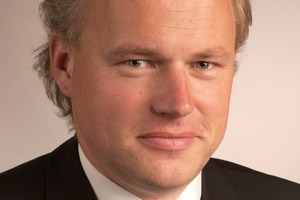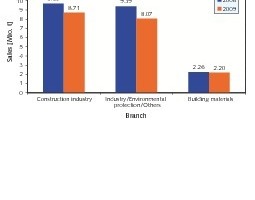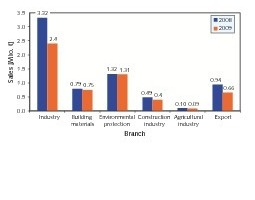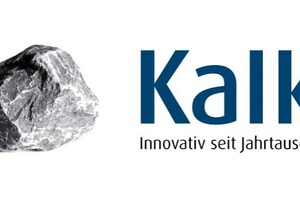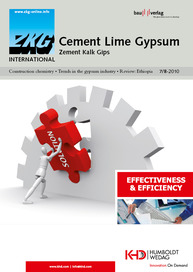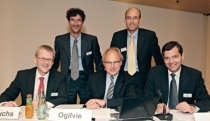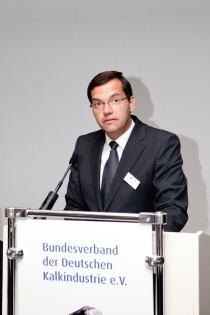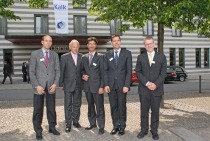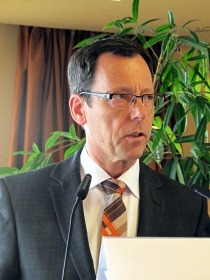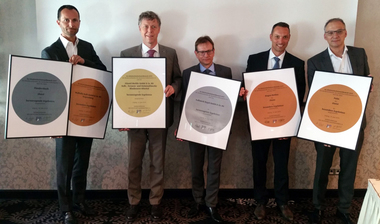Lime industry’s economic situation improves
Annual conference of the Federal German Association of the Lime Industry, Hamburg/Germany (17.06.2010)The member companies of the Federal German Association of the Lime Industry, meeting in Hamburg, have again unanimously confirmed Michael Liell (Fig. 1), member of the Board of Management of Rheinkalk GmbH, Wülfrath, as chairman of the organization, and Moritz Iseke (Fig. 2), managing director of Kalkwerke H. Oetelshofen GmbH & Co. KG, Wuppertal, as deputy chairman. Both declared their pleasure at the privilege of continuing to represent the German lime industry, jointly with chief executive officer, Martin Ogilvie (Fig. 3), for the coming two years.
“Precisely in these times of great political and economic challenge, it is of critical importance that the lime industry is represented by a strong organization in Berlin and Brussels, in order to be able to highlight the industrial-policy necessities for the lime industry and for Germany, as an industrial location”, affirmed reelected chairman Liell. “As a representative of a globally active lime producer, I am only too aware that the location conditions in Germany must not be allowed to deteriorate further if we wish to retain industry here”, he added.
The chairman also presented the lime industry‘s latest statistics: the downturn in natural lime products which started in the autumn of 2008 continued in 2009. The industry had already been confronted with a 6 % decline in 2008. Total sales now amounting to 19 million t, were a again 11 % down (Fig. 4).
Practically all of these sales were to the construction industry, particularly the highway engineering sector. The fall in sales for this segment was, at less than 10 %, less severe than in the other sectors. How highway engineering will cope following the expiry of the economic recovery programs and the desolate budget situations of the German federal states and municipalities remains to be seen, however.
Although supplies for environmental protection applications increased, a negative overall result was caused by the downturn in the industrial sector and in the iron and steel industry, in particular. More than 28 % less limestone products were sold here than even in 2008.
The results for sales of lime fertilizers to the agricultural and forestry sectors were, at 1.3 million t, 14.1 % below the figures for 2008. Even more dramatic is the 2009 result for burnt products (Fig. 5). Supplies of burnt lime to the iron and steel industry were, even in 2008, 3 % down, at 2.4 million t. Less than 1.8 million t were sold in 2009, signifying an almost 27 % decline in sales. The overall volume for industry as a whole dropped to 2.4 million t, a decrease of 27.8 %. One in every four tonnes of sales has thus been lost.
Use in the environmental protection sector has developed differently in the various segments. There was a 9.7 % decrease to 451 000 t in the case of water treatment, which must, however, be set against a slight increase, to 857 000 t for air-pollution prevention applications. This sector developed, all in all, only moderately, at –1.2 %.
Even in the previous year, the lime industry had accepted that it would have to anticipate significantly lower levels of sales, and not only in the short-term. The first four months of 2010 demonstrate that this roller coaster ride continues.
Despite the long winter, the lime industry sold a total of 2.03 million t from January to April in the field of burnt products, signifying growth of 16.9 % compared to the same period in the previous year. Sales to industry rose from 0.715 million t to 1.04 million t. The lime industry benefited in both sectors from the upturn in its important sales sectors, the iron/steel and chemicals industries. The environmental-protection sector also exhibited growth, at 0.45 million t. On the other hand, the downward trend in the building-materials and construction industries continued.
The German lime industry has a positive outlook for the near future. It has, nonetheless, appealed to the federal government in the clearest terms not – even in the context of the so-called economies package – to place further burdens on this energy-intensive industry and not thus to asphyxiate the incipient upturn. The concern in the lime industry is not one of the reduction of subsidies or of so-called “free-riding”, but instead quite simply of the avoidance of further competition-impairing burdens.
The chief executive officer of the federal association, Martin Ogilvie, submitted the 2009/2010 report to the meeting of members, explaining the most important topics. Current core association activities include the concept for emissions trading after 2012, scheduled implementation of the REACH requirements in the lime industry, and the federal government‘s new energy concept. “As an energy-intensive industry, we welcome the federal government‘s intention of drawing up a non-ideological energy policy, and will actively participate in the drafting process”, states Ogilvie. “We need an energy and raw materials program that takes account of the industrial-policy necessities of Germany as a location”.

